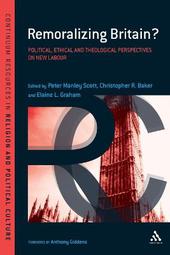
|
Remoralizing Britain?: Political, Ethical and Theological Perspectives on New Labour
Paperback / softback
Main Details
Description
On seeking office and in coming to power, New Labour presented its vision for Britain in moral terms. During the course of the New Labour administration, further moral themes have been introduced: responsibility and respect, the merits of local government and self-governance, and the moral imperative to confront threats of 'terror' from abroad. This moral agenda, with its apparently religious roots, has been much noted, but not much discussed. The political phenomenon of New Labour requires the disciplines of theology and ethics, as well as social theory and politics, to be properly understood and assessed. Drawing together for the first time theorists from a range of disciplines and commitments, this interdisciplinary collection offers a reckoning of this New Labour decade. As such, it has four central research questions: What is the nature of this remoralising? What are its sources? How effective has it been and what difference has this moral discourse made? What can be learned from Blairism about the relationship between faith, morals and governance?
Author Biography
Peter Manley Scott is Senior Lecturer in Christian Social Thought and Director of the Lincoln Theological Institute, University of Manchester. Christopher Baker is Director of Research for the William Temple Foundation and Senior Lecturer in Public and Urban Theology at the University of Chester, UK. Elaine Graham is Grosvenor Research Professor of Practical Theology at the University of Chester, UK.
Reviews"This collection of essays on the moral claims of Tony Blair's New Labour strategy and government could not be more timely and relevant. With the collapse of its economic claim to growing prosperity and financial prudence, what is left to sustain New Labour's agenda? Remoralizing Britain provides a unique interdisciplinary account of the religious sources and political impact of New Labour's critical turn from common ownership to communal values as the basis of its electoral appeal and government policies. These essays evaluate how that ethical turn worked out in practice in the Blair years. I commend this major case study to all who are concerned about the relationship between morality and government as citizens, members of faith communities and scholars." - William Storrar, Director, Center of Theological Inquiry, Princeton. "There is much in this book which is excellent. Many contributors are insightful and illuminating." Modern Churchpeople's Union
|